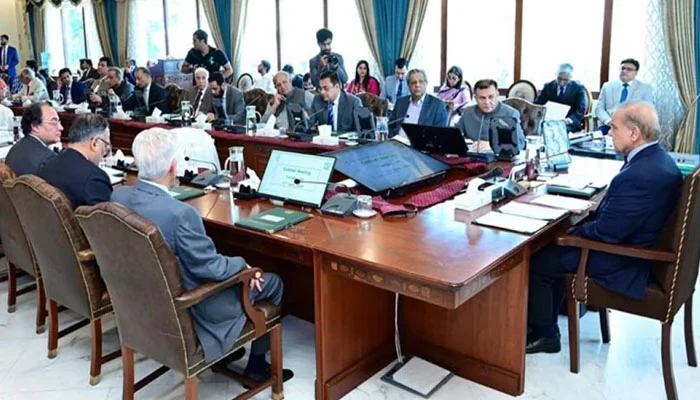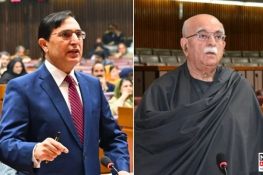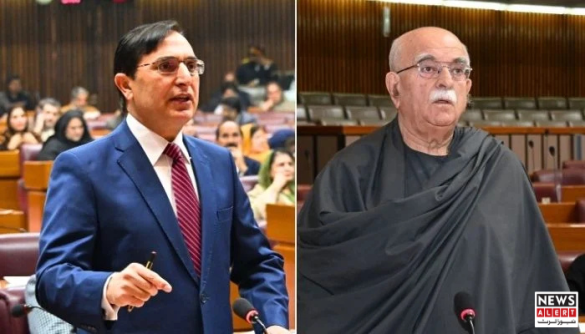Cabinet Greenlights Key Constitutional Reforms
Islamabad: Pakistan’s federal cabinet has approved the draft of the 27th Constitutional Amendment, marking a significant step toward wide-ranging institutional reforms. According to Law Minister Azam Nazeer Tarar, the amendment bill will be tabled in the Senate later today and then forwarded to a joint parliamentary committee for detailed review and consultation.
The cabinet meeting, chaired by Prime Minister Shehbaz Sharif via video link from Baku, Azerbaijan, included senior ministers and legal officials such as Defence Minister Khawaja Asif, Interior Minister Rana Sanaullah, Minister of State Musadik Malik, Riaz Hussain Pirzada, Awn Chaudhry, Shazra Mansab, Qaiser Ahmed Sheikh, Attorney General Mansoor Usman Awan, and Law Minister Tarar himself.
Consensus on a Constitutional Court
Law Minister Tarar announced that the cabinet had reached a broad consensus on establishing a Constitutional Court — a long-discussed proposal aimed at ensuring clarity in constitutional interpretation and minimizing institutional overlap.
He explained that under the proposed system, the power to transfer judges would rest with the Judicial Commission, with the Chief Justices of the High Courts participating in the process. This measure, according to Tarar, would help strengthen judicial independence and transparency.
Legal experts note that the creation of a constitutional court has been debated for years, particularly after several cases of judicial overreach and executive-judiciary tensions. The move could align Pakistan with countries like Germany and South Korea, where constitutional courts serve as specialized institutions to interpret constitutional matters.
Proposals on Senate and Executive Structure
The proposed 27th Amendment also seeks to make simultaneous Senate elections nationwide a constitutional requirement, aiming to bring consistency and prevent procedural delays. Furthermore, it suggests that elections for the Chairman and Deputy Chairman of the Senate be held every three years, enhancing the upper house’s democratic accountability.
The cabinet also reviewed proposals to increase the number of advisers to ministers from five to seven, and to formally recognize national heroes’ lifetime honors. Additionally, it discussed incorporating military titles and distinctions — such as Field Marshal and equivalent ranks in the Navy and Air Force — into the Constitution.
Review of Article 243 and Institutional Coordination
Tarar said the cabinet also deliberated on Article 243, which deals with the command and control of the armed forces. He noted that lessons from past experiences had been factored into the proposed changes to ensure greater institutional balance.
This amendment is the product of wide consultation with coalition partners, Tarar emphasized. It is designed to strengthen governance, promote stability, and foster institutional harmony across the state.
Political Reactions and Expected Debate
According to parliamentary sources, the Senate session will begin this evening and may continue until Sunday. A detailed debate on the amendment is expected, with the final vote likely on Monday.
However, several opposition parties have expressed reservations over certain clauses, particularly those related to the judiciary’s role and the appointment mechanisms. Some opposition members are reportedly planning protests both inside and outside Parliament to voice their concerns.
If passed by a two-thirds majority, the amendment will become part of the Constitution — a development the government hopes will enhance political stability and reduce institutional friction.
Growing Political Alignment
The cabinet’s move follows increasing momentum in support of the amendment across the political landscape. For instance, the Punjab Assembly recently submitted a resolution backing the 27th Amendment, highlighting growing provincial consensus on the issue. Read more here.
This alignment between the federal and provincial tiers indicates a rare moment of cross-party cooperation, a welcome development amid Pakistan’s otherwise polarized political environment.















